Direct and Indirect Speech Exercise
Turn the following sentences into indirect speech.
1. John said, ‘I am very busy now.’ 2. He said, ‘The horse has been fed.’ 3. ‘I know her name and address,’ said John. 4. ‘German is easy to learn,’ she said. 5. He said, ‘I am writing letters.’ 6. ‘It is too late to go out,’ Alice said. 7. He said to me, ‘I don’t believe you.’ 8. He says, ‘I am glad to be here this evening.’ 9. He said to me, ‘What are you doing?’ 10. ‘Where is the post office?’ asked the stranger. 11. He said, ‘Will you listen to me?’ 12. John said to Peter, ‘Go away.’ 13. She said to me, ‘Please wait here till I return.’ 14. ‘Call the witness,’ said the judge. 15. The speaker said, ‘Be quiet and listen to my words.’
1. John said that he was very busy then. 2. He said that the horse had been fed. 3. John said that he knew/knows her name and address. (Note that the tenses may not change if the statement is still relevant or if it is a universal truth.) 4. She said that German is/was easy to learn. 5. He said that he was writing letters. 6. Alice said that it was too late to go out. 7. He told me that he didn’t believe me. OR He said he didn’t believe me. 8. He says that he is glad to be here this evening. (When the reporting verb is in the present tense, adverbs of time and place do not normally change in indirect speech.) 9. He asked me what I was doing. 10. The stranger asked where the post office is/was. 11. He asked me if I would listen to him. 12. John ordered Peter to go away. 13. She asked me to wait there till she returned. 14. The judge commanded them to call the first witness. 15. He urged them to be quiet and listen to them.


Search Articles
Recent articles.
- Prepositions Quiz
- General Grammar Exercise
- Pronouns Exercise
- Proper Nouns Exercise
- General Vocabulary Exercise
- Identify the Adverbs Exercise
- Grammar Exercise (Intermediate Level)
- Intermediate Level Grammar Exercise
- General Grammar Worksheet
- Vocabulary Exercise
- Gap Filling Tenses Exercise
- Gap Filling Grammar Exercise
- More resources
EnglishPractice.com © 2024 - All rights Reserved.
Direct and indirect speech exercises PDF
- English grammar PDF
- PDF worksheets
- Mixed PDF tests
- Irregular verbs
- Modal verbs
- If-conditional
- Passive voice
- Reported speech
- Time clauses
- Relative clauses
- Indirect questions
- Question tags
- Imperative sentence
- Gerund and infinitive
- Direct | indirect object
Direct and indirect speech
- Online exercises
- Grammar rules PDF
English grammar books PDF
PDF book 1: English grammar exercises PDF
PDF book 2: English grammar rules PDF
Direct and indirect speech exercises
Reported speech exercises PDF
- Learn how to change tenses, pronouns, expressions of time and place in the reported speech.
Reported questions + commands exercises PDF
- Practise the difference between the direct and indirect speech in questions, commands and requests.
Online exercises with answers:
Direct - indirect speech exercise 1 Rewrite sentences in the reported speech.
Direct - indirect speech exercise 2 Report a short dialogue in the reported speech.
Direct - indirect speech exercise 3 Find and correct mistakes in the reported speech.
Direct - indirect speech exercise 4 Choose correct answers in a multiple choice test.
Indirect - direct speech exercise 5 Rewrite sentences from the reported speech to direct speech.
Reported questions, commands and requests:
Reported questions exercise 6 Change the reported questions and orders into direct questions and orders.
Reported questions exercise 7 Change direct questions into reported questions.
Reported commands exercise 8 Make reported commands and requests.
Grammar rules PDF:
Reported speech rules PDF Changes of tenses, pronouns, time and place in reported statements, questions and commands.
English grammar PDF All PDF rules with examples on e-grammar.org.
Direct + indirect speech
See also: Reported questions + commands
The direct and indirect speech are used to say what other people said, thought or felt. "I like it," he said. - He said that he liked it. "Dan will come," she hoped. - She hoped Dan would come.
The reported (indirect) speech is typically introduced by verbs such as say, tell, admit, complain, explain, remind, reply, think, hope, offer, refuse etc. in the past tense. He said (that) he didn't want it. She explained that she had been at the seaside.
If these verbs are in the past tense, we change the following: a) verb tenses and verb forms b) pronouns c) the adverbs of time and place
A) Verb tenses
We change the tenses in the following way:
- Present - past "I never understand you," she told me. - She told me she never understood me. "We are doing exercises," he explained. - He explained that they were doing exercises.
- Present perfect - past perfect "I have broken the window," he admitted. - He admitted that he had broken the window. "I have been waiting since the morning," he complained. - He complained that he had been waiting since the morning.
- Past - past perfect "She went to Rome," I thought. - I thought that she had gone to Rome. "He was thinking of buying a new car," she said. - She said he had been thinking of buying a new car.
- Will - conditional Will changes into the conditional. I will come on Sunday," he reminded me. - He reminded me that he would come on Sunday.
As you can see, both the past tense and the present perfect change into the past perfect.
Notes 1. I shall, we shall usually become would . "I shall appreciate it," he said. - He said he would appreciate it. 2. I should, we should usually change into would . "We should be really glad," she told us. - She told us they would be really glad. 3. May becomes might . "I may write to him," she promised. - She promised that she might write to him.
The verb forms remain the same in the following cases:
- If we use the past perfect tense. Eva: "I had never seen him." - Eva claimed that she had never seen him.
- If the reporting verb is in the present tense. Bill: "I am enjoying my holiday." - Bill says he is enjoying his holiday. Sandy: "I will never go to work." - Sandy says she will never go to work.
- When we report something that is still true. Dan: "Asia is the largest continent." - Dan said Asia is the largest continent. Emma: "People in Africa are starving." - Emma said people in Africa are starving.
- When a sentence is made and reported at the same time and the fact is still true. Michael: "I am thirsty." - Michael said he is thirsty.
- With modal verbs would, might, could, should, ought to, used to. George: "I would try it." - George said he would try it. Mimi: "I might come." - Mimi said she might come. Steve: "I could fail." - Steve said he could fail. Linda: "He should/ought to stay in bed." - Linda said he should/ought to stay in bed. Mel: "I used to have a car." - Mel said he used to have a car.
- After wish, would rather, had better, it is time. Margo: "I wish they were in Greece." - Margo said she wished they were in Greece. Matt: "I would rather fly." - Matt said he would rather fly. Betty: "They had better go." - Betty said they had better go. Paul: "It is time I got up." - Paul said it was time he got up.
- In if-clauses. Martha: "If I tidied my room, my dad would be happy." - Martha said that if she tidied her room, her dad would be happy.
- In time clauses. Joe: "When I was staying in Madrid I met my best friend." - He said that when he was staying in Madrid he met his best friend.
- We do not change the past tense in spoken English if it is clear from the situation when the action happened. "She did it on Sunday," I said. - I said she did it on Sunday. We must change it, however, in the following sentence, otherwise it will not be clear whether we are talking about the present or past feelings. "I hated her," he said. - He said he had hated her.
- We do not usually change the modal verbs must and needn't . But must can become had to or would have to and needn't can become didn't have to or wouldn't have to if we want to express an obligation. Would/wouldn't have to are used to talk about future obligations. "I must wash up." - He said he must wash up/he had to wash up. "I needn't be at school today." - He said he needn't be/didn't have to be at school that day. "We must do it in June." - He said they would have to do it in June. If the modal verb must does not express obligation, we do not change it. "We must relax for a while." (suggestion) - He said they must relax for a while. "You must be tired after such a trip." (certainty) - He said we must be tired after such a trip.
B) Pronouns
We have to change the pronouns to keep the same meaning of a sentence. "We are the best students," he said. - He said they were the best students. "They called us," he said. - He said they had called them. "I like your jeans," she said. - She said she liked my jeans. "I can lend you my car," he said. - He said he could lend me his car.
Sometimes we have to use a noun instead of a pronoun, otherwise the new sentence is confusing. "He killed them," Kevin said. - Kevin said that the man had killed them. If we only make mechanical changes (Kevin said he had killed them) , the new sentence can have a different meaning - Kevin himself killed them.
This and these are usually substituted. "They will finish it this year," he said. - He said they would finish it that year. "I brought you this book," she said. - She said she had brought me the book. "We want these flowers," they said. - They said they wanted the flowers.
C) Time and place
Let's suppose that we talked to our friend Mary on Friday. And she said: "Greg came yesterday." It means that Greg came on Thursday. If we report Mary's sentence on Sunday, we have to do the following: Mary: "Greg came yesterday." - Mary said that Greg had come the day before. If we say: Mary said Greg had come yesterday , it is not correct, because it means that he came on Saturday.
The time expressions change as follows. now - then, today - that day, tomorrow - the next day/the following day, the day after tomorrow - in two days' time, yesterday - the day before, the day before yesterday - two days before, next week/month - the following week/month, last week/month - the previous week/month, a year ago - a year before/the previous year
Bill: "She will leave tomorrow." - Bill said she would leave the next day. Sam: "She arrived last week." - Sam said she had arrived the previous week. Julie: "He moved a year ago." - Julie said he had moved a year before.
Note If something is said and reported at the same time, the time expressions can remain the same. "I will go on holiday tomorrow," he told me today. - He told me today he would go on holiday tomorrow. "We painted the hall last weekend," she told me this week. - She told me this week they had painted the hall last weekend. On the other hand, if something is reported later, the time expressions are different in the indirect speech. Last week Jim said: "I'm playing next week." If we say his sentence a week later, we will say: Jim said he was playing this week.
Here usually becomes there . But sometimes we make different adjustments. At school: "I'll be here at 10 o'clock," he said. - He said he would be there at 10 o'clock. In Baker Street: "We'll meet here." - He said they would meet in Baker Street.
- All PDF exercises and grammar rules from this website.

Reported speech - 1
Reported speech - 2
Reported speech - 3
Worksheets - handouts
Reported speech
Worksheets - pdf exercises.
- Reported statements - worksheet
- Worksheet - reported questions
- Reported yes/no questions
- Worksheet - reported speech
- Reported speech - exercises pdf
- Indirect speech - exercises
- Reported speech - exercises
- Mixed reported speech 1
- Mixed reported speech 2
- Reported speech 1
- Reported speech 2
- Reported speech 3
- Reported speech 4
- Reported speech 5
- Reported wh- questions
- Reported speech - worksheet
- Reported commands
- Reported questions
- Reported speech 1
- Reported speech 2
- Reported requests and orders
- Reported speech exercise
- Reported questions - worksheet
- Indirect speech - worksheet
- Worksheets pdf - print
- Grammar worksheets - handouts
Grammar - lessons
- Reported speech - grammar notes
- How to use reported speech - lesson
- Tense changes - grammar

100+Direct and Indirect Speech Exercises and Answers
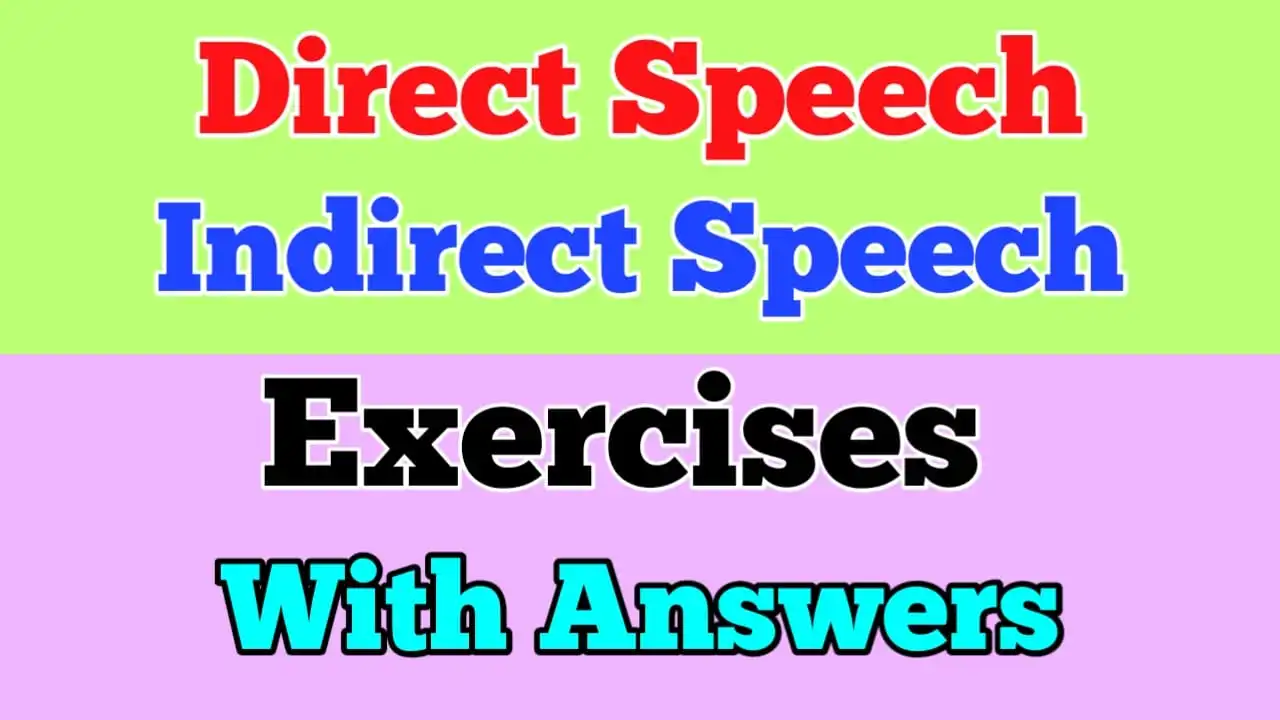
Improve your knowledge of Direct and Indirect Speech with our comprehensive set of Direct and Indirect Speech Exercises and Answers . Practice converting quotes to reported speech, understand the rules and techniques involved, and master the difference between direct and indirect speech. Sharpen your language skills and get a better grasp of the English language with our direct and indirect Speech exercises and answers.
Direct and Indirect Speech Exercises and answers are given in the following for practice. It’s important for students as well as for competitive Exams. For practice and easy comprehension, Direct and indirect speech Exercises and answers have been arranged according to different rules in the following.
With these Direct and indirect speech exercises with answers , the students will make themselves able to change Direct speech into indirect speech and indirect speech into direct speech with a Change of tenses, change of pronouns, and change of time and place words in different sentences .
Exercises on How to Change Tenses with Answers
Change the mode of narration from direct Speech to indirect speech .
(1) He said to me, “I can’t recall your name.” Ans: He told me that he could not recall my name.
(2) Poulami says, “I am fine.” Ans: Poulomi says that she is fine.
(3) He said, “I did it.” Ans: He said that he had done it.
(4) “I know her address,” said Gopi. Ans: Gopi said that he knew her address.
(5) Ram said, “The earth is round.” Ans: Ram said that the Earth is round.
(6) “We planted it ourselves,” said the grandfather. Ans: The Gran Father said that they had planted it themselves.
(7) Debu said, “I have been playing rugby.” Ans: Debu said that he had been playing rugby.
(8) Purbasha said to me,” I am afraid of ghosts.” Ans: Purbasha told me that she was afraid of ghosts.
People also like
Change the following mode of narration from direct Speech to indirect speech .
(1) The boys said, “It has been raining since morning. We cannot play today.” Ans: The boys said that it had been raining since morning so they could not play that day.
(2) Anjan’s mother said, “Your father has left for Mumbai.” Ans: Anjan’s mother said that my father had left for Mumbai.
(3) My teacher said, “Practice makes a man perfect.” Ans: My teacher said that practice makes a man perfect.
(4) He says, “I go to the temple every morning.” Ans: He says that he goes to the temple every morning.
(5) He said to me, “I will not get down from the bus.” Ans: He told me that he would not get off the bus.
(6) Rita says to Mita, “I will go with you.” Ans: Rita tells Mita that she will go with her.
(7) The boy said to his friend, “I went to school yesterday.” Ans: The boy told his friend that he had gone to school the previous day.
(8) You said, “I was right.” Ans: You said that you had been right.
(9) “I ‘ll go to the top,” said the young lady. Ans: The young lady said that she would go to the top.
(10) I ‘ve got my rules,” the conductor said to me. Ans: The conductor told me that he had got his rules.
Change of Pronouns Exercises and Answers
(1) He said to me, “ I have done the job.” Ans: He told me that he had done the job.
(2) Rohit said, “ I was absent yesterday.” Ans: Rohit said that he had been absent the previous day.
(3) The boy said, “ My father died two years ago.” Ans: The boy said that his father had died two years before.
(4) He said, “ My goal is to climb Mt Everest. “ Ans: He said that his goal was to climb Mount Everest.
(5) “ I shall certainly do nothing of this kind”, the woman. Ans: The woman said that she would certainly do nothing of that kind.
(6) The man said, “ I am exhausted.” Ans: The man said that he was exhausted.
(7) He said, “ I am washing my hands.” Ans: He said that he was washing his hands.
(8) Mother bird said to her little ones, “Today I will teach you how to fly.” Ans: Mother bird told her little ones that that day, she would teach them how to fly.
(9) Rita’s father says. “ I have done this for you. Ans: Rita’s father says that he had done that for her.
(10) Sumana said to her sister, “ I want to play with you.” Ans: Sumana told her sister that she wanted to play with her.
Change of Time & place for Direct Indirect Speech
Change the following sentences into indirect speech.
(1) The boy said to his father, “I had my tiffin in school yesterday. “ Ans: The boy told his father that he had had his tiffin in school the previous day .
(2) The captain informed, “The tournament was postponed last year. “ Ans: The captain informed us that the tournament was postponed the previous year .
(3) She said, “We have been living here for two years.” Ans: She said that they had been living there for two years.
(4) Arnab said to Ajit,” I am happy today .” Ans: Arna told Ajit that he was happy that day.
(5) My friend said to me, “We went to the zoo yesterday. “ Ans: My friend told me that they had gone to the zoo the previous day.
(6) The clerk said, “I’ll do the work now. “ Ans: Clark said that he would do the work then.
(7) Hiten said to Mihir, “I received this letter yesterday. “ Ans: Hiten told me that he had received that letter the previous day.
(8) Rajib said to me. “I shall go to the picture today. “ Ans: Rajiv told me that he would go to the picture that day.
(9) He said, “We are very happy here. “ Ans: He said that they were very happy there.
(10) The farmer said, “I’ll sow the seeds now. “ Ans: The farmer said that he will show the seats then.
(12) The man said to me, “I received your gift yesterday. “ Ans: The man told me that he had received my gift the previous day.
(15) I said to my friend, “You were present in the class yesterday. “ Ans: I told my friend that he had been present in the class the previous day.
Assertive Sentences Exercises with Answers
Change the following sentences converting the direct speeches into indirect speeches.
(1) The teacher said to the boy, “You have forgotten the lesson.” Ans: The teacher told the boy that he had forgotten the lesson.
(2) The boy said, “I shall go out and play.” Ans: The boy said that he would go out and play.
(3) He said, “I am happy to be here today.” Ans: He said that he was happy to be there that day.
(4) They said, “We shall play the game again tomorrow.” Ans: They said that they would play the game again the next day.
(5) The boy said, “Two and two make four.” Ans: The boy said that two and two make four.
Change the form of narration from indirect speech into direct speech.
(1) She told them that she had lost her books and theirs too. Ans : “I have lost my books and yours too”, she told them.
(2) The princess says that she has lost her way. Ans: The princess says, “I have lost my way.”
(3) They say that they must keep their locality clean. Ans: They say, “We must keep our locality clean.”
(4) The girl says that those books are theirs, but that one is hers. Ans: The girl says, “These books are theirs, but this one is mine.”
(5) The Happy prince said that he had led the dance in the Great Hall. Ans: The Happy Prince said, “I led the dance in the great hall.”
Interrogative Sentences Direct and Indirect Speech Exercises
Turn the following sentences from direct speech to indirect speech.
(1) Bulbuli said to her friend, “Will you come tomorrow?” Ans: Bulbuli asked her friend if she would on the next day.
(2) The policeman said to the stranger, “What are you looking for?” Ans: The police asked the stranger what he was looking for.
(3) Nikhil said to me, “Why do you look sad? Ans: Nikhil asked me why I looked sad.
(4) I said to her, “Did you take tea ?” Ans: I asked her if she had taken tea.
(5) The girl said to her mother, “Will you give me your bangles ?” Ans: The girl asked her mother if she would give her her bangles.
(6) Father said to me, “Why are you so upset?” Ans: Father asked me why I was so upset.
Change the following indirect speech into Direct speech.
(1) She asked me if I had called her. Ans: She said to me, “Did you call me ?”
(2) He asked me if I was writing a letter. Ans: He asked me, “Are you writing a letter ?”
(3) The man asked the child how he had got there. Ans: “How did you get here, child ?”, the man said.
(4) The police asked me if I could show my identity card. Ans: The police said to me, “Can you show your identity card ?”
(5) He asked us if we were attending the meeting that day. Ans: He said to us, “Are you attending the meeting today?”
(6) I asked her if she had taken medicine. Ans: I said to her, “Did you take medicine ?”
(7) Raja asked Dipu if he would go to school that day. Ans: Raja said to Dipu, “Will you go to school today?
Imperative Sentences Exercises with Answers
Change the following sentences from direct speech to indirect speech.
(1) The teacher said to the students, “Keep quiet.” Ans: The teachers ordered the students to keep quiet.
(2) My teacher said to me. “Do not neglect your studies.” Ans: My teacher advised me not to neglect my studies.
(3) The man said to his son, “Always try to be honest.” Ans: The man advised it’s on to always try to be honest.
(4) Mother said to Raju, “Do not run in the sun.” Ans: Mother ordered Raju not to run in the sun.
(5) The man said to me, “Brother, please help me.” Ans: Addressing as a brother, the man requested me to help him.
(6) The students said, “Please allow us to play in the field.” Ans: The students requested to allow them to play on the field.
(7) He said to me, “Please give me some money.” Ans: He requested me to give him some money.
Exercise 10
Change the following sentences from Indirect speech to Direct Speech of narration.
(1) He advised me not to waste my valuable time. Ans: He said to me, “Don’t waste your valuable time.”
(2) The grandson advised the children not to pluck flowers. Ans: The gardener said to the children, “Do not pluck flowers.”
(3) Tom forbade Sid to shake him. Ans: Tom said to Sid, “Don’t shake me.”
(4) The master ordered the servant to sort the door. Ans: The master said to the servant, “Shut the door.”
(5) The commander ordered the soldiers to stand at ease. Ans: The commander said to the soldiers, “Stand at ease.”
(6) Addressing as sethji, the vendor told him not to rob the poor. Ans: “Sethji, don’t rob the poor”, said the vendor.
(7) The doctor advised the patient to take proper vitamins to stay healthy. Ans: The doctor said to the patient, “Take proper vitamins to stay healthy.”
(8) The teacher ordered the students to do it then. Ans: The teacher said to the students, “Do it now.”
Direct and indirect speech Exercises Answers with “Let”
Exercise 11.
Change the following sentences from direct speech to indirect speech mode of narration.
(1) Rahim said, “Let us decide the matter together.” Ans: Rahim suggested that they should decide the matter together.
(2) The boy said to me, “Let us play cricket.” Ans: The boy proposed that they should play cricket.
(3) He said, “Let me go home.” Ans: He wished that he might go home.
(4) He said to me, “Let him say whatever he likes.” Ans: He wished me that he might say whatever he liked.
(5) He shouted, “Let me go out. Ans: He shouted at me to go out.
Exercise 12
Change the following sentences from indirect speech to direct speech mode of narration.
(1) She proposed that they should go to the cinema. Ans: She said, “Let us go to the cinema.”
(2) He suggested that they should drop the matter. Ans: He said, “Let us drop the matter”
(3) They suggested that they should make him give them their fears back. Ans: “Let’s make him give us our fares back,” they said.
(4) Shabnam proposed Chandni that they should go for a walk. Ans: “Let us go for a walk.” said Shabnam to Chandni.
(5) The leader suggested that they should hold a meeting the next day. Ans: The leader said, “Let’s hold a meeting tomorrow.”
Direct and indirect speech Exercises Answers of Optative Sentences
Exercise 13.
Change the following from Direct Speech to Indirect Speech.
(1) I said to him, “May you be happy.” Ans: I wished that he might be happy.
(2) Mother said to me, “May God bless you.” Ans: Mother prayed that God might bless me.
(3) He said, “May his soul rest in peace.” Ans: He prayed that his soul might rest in peace.
(4) The girl said, “Oh, had I the wings of a dove.” Ans: The girl wished that she could have the wings of a dove.
(5) I said to him, “May you live long.” Ans: I wished him that he might live long.
Exercise 14
Change the following from Indirect Speech to Direct Speech.
(1) Nilima wished me that I might recover soon. Ans: Nilima said to me, “May you recover soon.”
(2) Mother wished him that God might grant him a long life. Ans : Mother said to him, “May God grant you a long life.”
(3) The holy man wished that peace might prevail. Ans: The holy man said, “May peace prevail.”
(4) She wished that Mother Teresa might recover from illness soon. Ans: She said, “May Mother Teresa recover from illness soon.”
(5) He wished that he could bring his departed friend back to life. Ans: He said, “Oh, if I could bring my departed friend back to life.”
Direct and Indirect Speech Exercises of Exclamatory Sentences
Exercise 15.
(1) The boys triumphantly said, “Hurrah! We have won the match.” Ans: The boys exclaimed in joy that they had won the match.
(2) The old man said to the girl, “May you be happy !” Ans: The old man wished the girl that she might be happy.
(3) He said, “What good news!” Ans: He exclaimed in joy that it was very good news.
(4) The children said, “How happy we were there!” Ans: The children gloomily said that they had been very happy there.
(5) He said to you. “May God bless you.” Ans: He wished you that God might bless you.
(6) My friend said to me. “What a fool you are!” Ans: My friend exclaimed in despair that she was a big fool.
Exercise 16
(1) Piyali exclaimed in sorrow that she had lost her phone. Ans: “Alas! I have lost my phone”, said Piyali.
(2) Mother wished Roy that his dreams might come true. Ans: Mother said to Roy, “May your dreams come true.”
(3) The girl exclaimed that she had been very sensible. Ans: How insensible I have been!”, said the girl.
(4) The girl exclaimed in sorrow that she had torn her frock. Ans: The girl said, “Oh dear! I have torn my frock.”
(5) She exclaimed in sorrow that she was undone. Ans: She said, “Alas! I am undone.”
(6) They wished me happy birthday. Ans: They said to me. “Happy birthday!”
(7) The students bade their teacher good morning. Ans: “Good morning, Madam!”, said the students to the teacher.
Practice Direct and Indirect Speech Exercises
A . Change the following into reported speech .
1. Rita says, “Kishore sang a song”.
2. The saint said, “Man is mortal”
3. You said, “we are learning our lesson’.
4. He said to me, “My father went to Mumbai last week.
5. I said to her, “Are you leaving tonight?”
6. He said to her, “Can you lend me your umbrella?”
7. She said, “I saw a tiger here’.
8. The principal said, “well done! my boys”.
9. She said, “Let them play.”
10. I said to Harsh, “Please help me.”
B. Change the direct speech into Indirect Speech
1. He asked me, “Where has he gone?”
2. The Prime Minister said, “National Integrity will be preserved at all costs.
3. She said, “My uncle came yesterday.”
4. Sheela said to us, “You must work hard.”
5. They said, “We trust in God.”
6. The officer said to him. “You will be dismissed if you do not attend the office in time.'”
7. He said to me “I am reading a book.”
8. He said, “Thanks for reminding me.’
9. She said,” Keep this room open.’
10. I said to him, “I went there on Tuesday.”
C. Choose the correct option .
1. I advised him ____________ it.
(a) to not do
(b) not to do
2. She told me ____________ careful.
(c) that be
3. She asked me if I ____________ my lunch.
(b) have eaten
(c) had eaten
4. She asked me ____________ going to the movies
(a) that I was
(b) if was I
(c) if I was
5. The dentist suggested ____________ get a new toothbrush.
(b) that I should
(c) me that I should
6. She said that no one ____________ me
(c) had called
7. He asked me ____________ to deserve such a cruel punishment.
(a) what had he done
(b) what he had done
(c) that he had done
8. He promised he ____________ do it by the end of the week.
9. She said that ____________ me before.
(a) she hadn’t met
(b) she did not meet
(c) she will not meet
10. I requested her____________ me.
(b) to help
(c) that help
D. Complete the sentences in reported speech.
1. The girl said that it ___________ to be there that evening.
(a) gave her great pleasure
(b) gives her great pleasure
(c) gives her great pleasure
2. The man said that he ___________ as soon as possible.
(a) must go
(b) had gone
(c) should be gone
3. She said that she ___________ to se any of them.
(a) does not want
(b) did not want
(c) had not wanted
4. The teacher says that if you work hard you ___________
(a) would pass
(b) will pass
5. He said that he ___________
(b) has won
(c) had won
6. He proposed that they ___________ for her return.
(a) shall wait
(b) will wait
(c) should wait
7. Alice exclaimed how clever ___________
(a) she was
(b) was she
(c) she has been
8. The young man asked which way she ___________
(a) has gone
(c) would go.
9. He asked me where ___________ going.
10. She requested them to wait there till she ___________
(a) returns
(b) returned
(c) will return
E. Complete the sentence in reported speech.
1. Ravi said, “I love this place”.
Ravi said _______________
2. “Do you like football?” He asked me.
He asked me_______________
3. “I can’t drive a lorry”, he said.
He said _______________
4. “Be nice to your brother”, he said
He asked me _______________
5. “Don’t be nasty, “he said
He urged me _______________
6. “Don’t waste your money “she said,
She told the boys _______________
7. “What have you decided to do? “she asked
him. She asked him _______________
8. “I always wake up early”. he said,
He said_______________
9. “You should revise your lessons’, he said,
He advised the students _______________
10. “Where have you been? “he asked me
He wanted to know _______________
F. Complete the sentence in reported speech.
1. She said, “I went to cinema yesterday,”
She said _______________
2. You said, “I will do this for him.”
You said _______________
3. He said, “I am writing a test tomorrow,
4. She said, “I am not hungry now”,
5. They said, “We have never been here before.”
They said _______________
6. They said, “We were in London last week.”
7. He said, “They won’t sleep.”
8. “Have you been shopping?” he asked us.
9. She said, “It is very quiet here.
10. “I don’t speak Italian”, she said.
She said_______________
Direct and Indirect Speech Answers Key
1. Rita says that Kishore sang a song.
2. The saint said that the man is mortal.
3. You said that you were learning your lesson.
4. He hold me that his father had gone to Mumbai the previous week.
5. I asked her if she was leaving that night.
6. He asked her if she could lend him her umbrella.
7. She said that she had seen a tiger there.
8. The principal exclaimed with applause that the boys had done well.
9. She suggested that they should be allowed to play.
10. I requested Harsh to help me.
1. He asked me where he had gone.
2. The Prime Minister declared that the National Integrity would be preserved at all costs.
3. She said that her uncle had come the previous day.
4. Sheela told us that we must work hard.
5. They said that they trusted in God.
6. The officer warned him that he would be dismissed
if he did not attend the office in time.
7. He told me that he was reading a book.
8. He thanked me for reminding him.
9. She ordered to keep that room open.
10. I told him that I had gone there on Tuesday.
1. (b) not to do
2. (b) to be
3. (c) had eaten
4. (c) if I was
5. (b) that I should
6. (c) had called
7. (b) what he had done
8. (b) would
9. (a) she hadn’t met
10. (b) to help
1. (a) gave her great pleasure.
2. (a) must go
3. (b) did not want
4. (b) will pass
5. (c) had won
6. (c) should wait
7. (a) she was
8. (b) had gone
9. (a) I was
10. (b) returned
1. that he loved that place
2. whether I liked football
3. that he couldn’t drive a lorry
4. to be nice to my brother
5. not to be nasty
6. not to waste their money
7. what he had decided to do
8. that he always wake up early
9. to revise their lessons
10. where I had been
1. that she had gone to cinema the previous day.
2. that you would do that for him.
3. that he will be writing a test the next day.
4. that she was not hungry then.
5. that they had never been there before.
6. that they had been in London the previous week.
7. that they wouldn’t sleep.
8. whether we had been shopping.
9. that it was very quiet there.
10. that she didn’t speak Italian.
FAQs on Direct and Indirect speech
Q: what’s the purpose of the indirect speech.
A: Indirect speech allows us to convey someone else’s words without quoting them verbatim. It’s useful for summarizing and paraphrasing.
Q: Are tense changes mandatory in indirect speech?
A: Yes, tense changes are often necessary to accurately reflect the timing of the original statement.
Q: Can reporting verbs be used interchangeably?
A: While reporting verbs can be interchangeable to some extent, their nuances can impact the meaning of the reported speech.
Q: Is it possible to transform any direct speech into indirect speech?
A: Yes, most direct speech can be converted into indirect speech, although some cases may require adjustments.
Q: How can I identify indirect speech in a sentence?
A: Look for keywords like “said,” “asked,” or other reporting verbs, as well as changes in pronouns, tenses, and time expressions.
Q: Why is mastering direct and indirect speech important?
A: Mastering these skills enhances communication clarity, adds variety to language use, and fosters effective expression.
Conclusion:
Direct and indirect speech exercises and answers are invaluable tools for effective communication. By honing this skill, you’ll not only convey information accurately but also showcase your language expertise. Remember that practice makes perfect, and the more you engage in these exercises, the more naturally you’ll incorporate them into your everyday language use.
Related posts:

- Child Login
- Number Sense
- Measurement
- Pre Algebra
- Figurative Language
- Reading Comprehension
- Reading and Writing
- Science Worksheets
- Social Studies Worksheets
- Math Worksheets
- ELA Worksheets
- Online Worksheets
Browse By Grade
- Become a Member

- Kindergarten

- Active and Passive Voice
- Capitalization
- Comparative and Superlative Adjectives
- Conditionals
- Conjunctions
- Contractions
- Determiners and Quantifiers
- Diagramming Sentences
- Direct and Indirect Objects
- Direct and Indirect Speech
- Double Negatives
- Interjections
- Parts of Speech
- Phrasal Verbs
- Prepositions
- Punctuation
- Question Words
- Sentences for Beginners
- Shift in Verb Tenses
- Simple, Compound, and Complex Sentences
- Subject and Object Complements
- Subject and Predicate
- Subject-Verb Agreement
- Tag Questions
- Transition Words
- Types of Sentences

- Abbreviation
- Alphabetical Order
- Collocations
- Commonly Confused Words
- Compound Words
- Connotations and Denotations
- Crossword Puzzles
- Positive and Negative Connotations
- Shades of Meaning
- Sorting and Categorizing
- Word Search

- Alliteration
- Onomatopoeia
- Personification
- Proverbs and Adages
- Rhyming Words

- Beginning Sounds
- Consonant Blends
- Consonant Digraphs
- Ending Sounds
- Long and Short Vowels
- Middle Sounds
- R-Controlled Vowels
- Silent Letters
- Vowel Digraphs

- Kindergarten Reading Comprehension
- Grade 1 Reading Comprehension
- Grade 2 Reading Comprehension
- Grade 3 Reading Comprehension
- Grade 4 Reading Comprehension
- Grade 5 Reading Comprehension
- Grade 6 Reading Comprehension
- Grade 7 Reading Comprehension
- Grade 8 Reading Comprehension

- Alphabet and Letters
- Cause and Effect
- Dictionary Skills
- Editing and Proofreading
- Facts and Opinions
- Making Predictions
- Word Recognition
Direct and Indirect Speech Worksheets
- Language Arts >
- Grammar >
Fend off any errors that might creep into your speech with our free, printable direct and indirect speech worksheets! We use direct speech to quote the exact same words that someone utters. The indirect speech is used to report someone's speech, often with words slightly changed. Convert a range of sentences including the interrogative, imperative, and exclamatory sentences into reported speech. Make your grammar life richer and more fulfilling with this coveted collection of quoted and reported speech worksheets pdf!
Our direct and reported speech worksheet pdfs are most recommended for children in 4th grade through 8th grade.
Reported Speech with Time Expressions
Kids in 5th grade, 6th grade and 7th grade convert sentences into indirect speech, paying attention to how expressions of time change here. For example, write "that day" for "today" and "the next day" for "tomorrow".
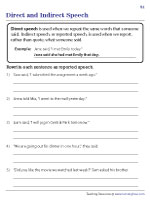
Writing Statements in Reported Speech
Both direct speech and indirect speech have their natural habitat, and children must use each where it belongs. In these direct and indirect speech worksheets pdf, grade 7 and grade 8 kids write each statement as reported speech.
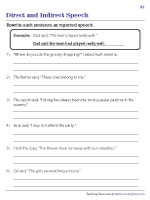
Changing Interrogative Sentences into Reported Speech
Don't write a question mark after "Sam asked me where I was going". This is a statement and not a question, although it contains the word "where". Let children write each interrogative sentence in reported speech here.
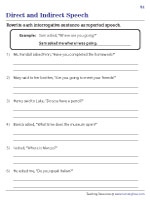
Converting Imperative Sentences into Reported Speech
Watch grade 6 kids rewrite sentences that denote a request, command, or advice in reported speech, using reporting verbs like "ordered", "instructed", and more in these printable direct and indirect speech worksheets!
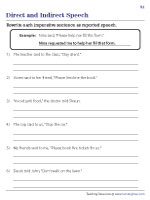
Rewriting Exclamatory Sentences Using Reported Speech
Thanks to scenarios that exclaim – sometimes with joy and other times with sorrow – these grade 8 worksheets are kinetic and ebullient. Upgrade your practice by converting exclamatory sentences into indirect speech.
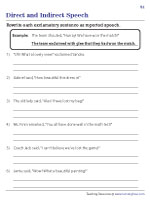
Changing Reported Speech into Direct Speech
In this section of our printable indirect and direct speech worksheets, there are sets of sentences in reported speech, and children are expected to write each sentence in the direct or quoted speech.
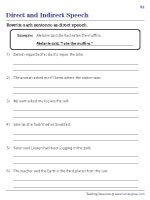
Punctuating Direct Speech
Instruct children in grade 4 and grade 5 to read the given sentences and insert commas and quotation marks wherever necessary to reflect direct speech.
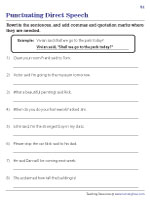
Related Printable Worksheets
▶ Active and Passive Voice
▶ Phrases
▶ Types of Sentences
Tutoringhour
What we offer, information.
- Membership Benefits
- How to Use Online Worksheets
- How to Use Printable Worksheets
- Printing Help
- Testimonial
- Privacy Policy
- Refund Policy
Copyright © 2024 - Tutoringhour
You must be a member to unlock this feature!
Sign up now for only $29.95/year — that's just 8 cents a day!
Printable Worksheets
- 20,000+ Worksheets Across All Subjects
- Access to Answer Key
- Add Worksheets to "My Collections"
- Create Custom Workbooks
Digitally Fillable Worksheets
- 1100+ Math and ELA Worksheets
- Preview and Assign Worksheets
- Create Groups and Add Children
- Track Progress
Choose a region
Direct and indirect speech exercises
There are many occasions in which we need to describe an event or action that happened, and very often that includes repeating what someone said. Such occasions can include a social situation as well as in a work email or presentation. In order to describe what people said there are two different types of speech – direct speech and indirect speech (or reported speech).
Read the article below to find out more about these forms and improve your English storytelling skills.
Do you want to practice your English speaking skills with small classes with native-level teachers? Find out more about Speak+ now
Direct Speech
When we want to describe what someone said, one option is to use direct speech . We use direct speech when we simply repeat what someone says, putting the phrase between speech marks:
- Paul came in and said, “I’m really hungry.”
It is very common to see direct speech used in books or in a newspaper article. For example:
- The local MP said, “We plan to make this city a safer place for everyone.”
As you can see, with direct speech it is common to use the verb ‘to say’ (‘said’ in the past). But you can also find other verbs used to indicate direct speech such as ‘ask’, ‘reply’, and ‘shout’. For example:
- When Mrs Diaz opened the door, I asked, “Have you seen Lee?”
- She replied, “No, I haven’t seen him since lunchtime.”
- The boss was angry and shouted, “Why isn’t he here? He hasn’t finished that report yet!”
Indirect Speech
When we want to report what someone said without speech marks and without necessarily using exactly the same words, we can use indirect speech (also called reported speech). For example:
- Direct speech: “We’re quite cold in here.”
- Indirect speech: They say (that) they’re cold.
When we report what someone says in the present simple, as in the above sentence, we normally don’t change the tense, we simply change the subject. However, when we report things in the past, we usually change the tense by moving it one step back. For example, in the following sentence the present simple becomes the past simple in indirect speech:
- Direct speech: “I have a new car.”
- Indirect speech: He said he had a new car.
All the other tenses follow a similar change in indirect speech. Here is an example for all the main tenses:

The same rule of moving the tenses one step back also applies to modal verbs. For example:

Using ‘say’ or ‘tell’
As an alternative to using ‘say’ we can also use ‘tell’ (‘told’ in the past) in reported speech, but in this case you need to add the object pronoun. For example:
- He told me he was going to call Alan.
- They told her they would arrive a little late.
- You told us you’d already finished the order.
Changing Time Expressions
Sometimes it’s necessary to change the time expressions when you report speech, especially when you are speaking about the past and the time reference no longer applies. For example:
- Direct speech: “I’m seeing my brother tomorrow .”
- Indirect speech: She said she was seeing her brother the following day .
Here are some other examples:
- Direct speech: “I had a headache yesterday .”
- Indirect speech: You said you’d had a headache the day before yesterday .
- Direct speech: “It’s been raining since this afternoon .”
- Indirect speech: He said it’d been raining since that afternoon .
- Direct speech: “I haven’t seen them since last week .”
- Indirect speech: She said she hadn’t seen them since the previous week .
Reporting Questions
When you report a question you need to change the interrogative form into an affirmative sentence, putting the verb tense one step back, as with normal reported speech.
There are two types of questions that we can report – questions that have a yes/no response, and questions that begin with a question word like ‘what’, ‘where’, ‘who’ etc. When we report a yes/no question, we use ‘if’. For example:
- Direct speech: “Do they live here?”
- Indirect speech: You asked me if they lived here.
As you can see, in the reported version of the question, ‘do’ is eliminated because it is no longer a question, and the verb ‘live’ becomes ‘lived’.
For questions starting with question words like ‘what’, ‘where’, ‘when’, ‘who’, etc., we report the question using the question word but change the interrogative form to the affirmative form. For example:
- Direct speech: “Where do they live?”
- Indirect speech: You asked me where they lived.
- Direct speech: “When are you leaving?”
- Indirect speech: He asked us when we were leaving .
- Direct speech: “How will they get here?”
- Indirect speech: She asked me how they would get here.
When we report a question we normally use the verb ‘ask’. As with the verb ‘to tell’, the verb ‘to ask’ is normally followed by an object pronoun, though it is possible to omit it.
Reporting Orders and Requests
When you give someone an order, you use the imperative form, which means using just the verb without a subject. For example:
- “ Call me back later.”
- “ Have a seat.”
- “ Don’t do that!”
To report an order we use ‘tell’ and the infinitive of the verb. For example:
- You told me to call you back later.
- He told me to have a seat.
- She told us not to do that.
When you make a request, you normally use words like ‘can’, ‘could’, or ‘will’. For example:
- “Could you call me back later?”
- “Will you have a seat?”
- “Can you not do that please?”
To report a request, we use the verb ‘to ask’ and the infinitive form of the verb. For example:
- You asked me to call you back later.
- He asked me to have a seat.
- She asked us not to do that.
Now you’ve seen how we use direct and indirect speech , practice using them yourself. An excellent and easy way to see how they are used is by reading a short story in English or a news article online, because stories and articles contain many examples of reported speech.
What are irregular plural nouns, and how can you remember them? Find out more here!
The passive form is a very useful structure in English. Read more to find out what it means and how to use it in your everyday English.

Get in touch
Ready to chat to a member of the Wall Street English team? We’re here to help you.
- Grade Levels
- Search Site
- Grade 6 >>
Direct and Indirect Speech Worksheets
Related ela standard: l.6-7.1.
Direct speech is basically a quote or the literal words that were spoken by a subject. When you use this in your writing it must be surrounded by quotation marks (" "). Using direct quotes helps your audience understand the frame of mind of the subject. Indirect speech is reporting what was said by a subject. Since all indirect speech has already happened it is reported in the past tense. To display indirect speech we surround it with inverted commas (' '). These worksheets will have students using this technique in the own writing and help them with syntax and mechanics of their work.
Direct and Indirect Speech Worksheets To Print:
What's Your Approach - Determine whether each sentence below contains this form of expression. Write direct or indirect on the line.
Sentence Smasher - Rewrite each sentence using indirect speech.
Peter and Dan - Read the passage. Underline the speaker's words. Then, rewrite the passage, incorporating this in there.
Too Much? - If the sentence is uses the direct form, write a D on the line. If it uses the indirect form, write an I on the line.
Be The Director - The comic strip below uses speech bubbles to show the direct form. Rewrite the comic strip on the lines below, using the indirect form.
Revising the Direct Form - Read the script. On the lines, rewrite the script as a paragraph, using indirect speech.
Speaker's Words - Indirect speech is when a speaker's words are reported by someone else, and the words are not quoted.
A Walk in the Park - Read the script. Rewrite it in paragraph form using both formats. Follow the directions in parentheses.
Play Re-writes - John said his train would arrive at noon and maybe it did.
Using Roundabouts - Read the cartoon. Then describe what is happening. Use the indirect technique in your paragraph to tell the reader what Abe and Lauren say.
Who Said That? - Underline what the speaker says in each sentence. Then rewrite each sentence using the proper form.
About the Car... - You want to know if Dad will let you take the car.
What Did They Say? - Rewrite the sentences using all the techniques that you have learned so far. Make sure the syntax is spot on.
Tell Me About the Party - Will told us all about the party. He said there were about ten people there. I asked him about Robert, and confirmed that Robert was in attendance.
Writing The Other Way - Most students find this harder to do then its counterpart.
What Is the Difference Between Direct and Indirect Speech
Here are the basic differences between direct and indirect speech.
Difference In Meaning
There are two ways to describe the speech. These two ways are known as indirectly and directly. These two methods are widely used in the English language to imply what others have said. Both have different rules when writing.
The direct form occurs when the exact same words of the speech are repeated without any interruptions or additions. Direct speech implies exactly what has been said in the same tone. The actual words that were used by the speaker are written in indirect speech. Nothing new is added. Expressions are also mentioned in the exact same way by maintaining the tone of the actual speaker. The direct form is used when you do want to keep things simple and accurate.
The indirect form occurs when the actual words of the speaker are not quoted. Indirect speech changes certain elements from the actual words. It occurs when someone else tries to speak the original words.
Difference In Alternative Name
Both direct and indirect speech have their own alternative names. Direct format is commonly known as quoted speech. Whereas, indirect form is commonly known as reported speech.
Difference In Point Of View
The indirect and direct speech also differ in point of views. The point of view of the direct speech is that of the speaker. Whereas, the point of view of indirect form is that of the listener.
Difference In Usage
The use of this technique in written has a difference in purpose and usage as well. The direct form is used when we want the reader to know what exactly was said by the speaker. No change in the message really ever occurs. Whereas, the indirect technique is used when we use our own words to report the words of someone else.
Difference In Quotation Marks
Direct technique uses quotation marks whereas, the indirect form does not use quotation marks.
Direct: She said, "I am going to the market". Indirect: She said that she was going to the market.
Teachers: Upgrade Now
- Print all 25,000+ worksheets
- All grade levels and topics
- Save endless hours of your time...
- Answers to everything too!
Get FREE English Worksheets In Your Email
- How We Are Aligned To The Common Core
- Educator Resources
- Privacy Policy
- Newsletters
© English Worksheets Land . All rights reserved.
- International
- Schools directory
- Resources Jobs Schools directory News Search

DIRECT AND INDIRECT SPEECH: WORKSHEETS WITH ANSWERS - 28 EXERCISES
Subject: English
Age range: 7-11
Resource type: Worksheet/Activity
Last updated
26 June 2021
- Share through email
- Share through twitter
- Share through linkedin
- Share through facebook
- Share through pinterest

A unit set of worksheets with answers on direct and indirect speech with 6 sessions on teaching and learning based on New Bloom’s Taxonomy.
This download includes:
EXERCISE 1: ROVING REPORTER: In your groups you will be recreating a TV news broadcast for event of the day, week, month or year like school assembly, teacher’s day, world peace day, literacy day, children’s day, environment day, world earth’s day, world book day or … EXERCISE 2: Identify the structure of the sentences when verbs are in the direct and indirect speech. EXERCISE 3: Answer these questions to test your understanding of the key terms used to understand direct and indirect speech. EXERCISE 4: Give examples to show how the adverbs of nearness in direct speech change into those of distance in indirect. Give examples to show the changes in modal verbs from direct speech to indirect. EXERCISE 5: Answer these questions to test your understanding of the changes seen in adverbs when converting direct into indirect speech. EXERCISE 6: Answer these questions to test your understanding of the changes seen in modal verbs when converting direct into indirect speech. EXERCISE 7: Give examples to show how the pronouns in direct speech change when in indirect. EXERCISE 8: Answer these questions to test your understanding of the changes seen in pronouns when converting direct into indirect speech. EXERCISE 9: Give examples for the rules followed in changing functional sentences from direct to indirect speech. Scaffolding Notes 6: Rules for Converting Functional Sentences from Direct to Indirect Speech EXERCSIE 10: Apply the rules of reported speech and verbalise the following visuals into direct and indirect speech. EXERCISE 11: Choose the one alternative which best expresses the given sentences in either direct or indirect speech. EXERCISE 12: Attempt the quiz to test your understanding of the rules followed for converting functional sentences from direct to indirect speech. EXERCISE 13: Give examples to show the tense changes from direct speech into indirect. EXERCISE 14: Answer these questions to test your understanding of the changes seen in tenses when converting direct into indirect speech. EXERCISE 15: Evaluate the correct use of punctuation in direct and indirect speech – Part 1. EXERCISE 16: Evaluate the correct use of punctuation in direct and indirect speech – Part 2. EXERCISE 17: Use narrative techniques, such as dialogue to develop experiences, events and characters. EXERCISE 18: Convert the following statements into indirect speech. EXERCISE 19: Punctuate the following to put them in direct speech. EXERCISE 20: Convert ‘Yes’ or ‘No’ type questions to indirect speech. EXERCISE 21: Choose - enquired, wondered, asked, told or said - to convert the following dialogues to indirect speech. EXERCISE 22: Convert the following ‘WH’ questions to indirect speech. EXERCISE 23: Write the following dialogues in direct speech and then complete the sentences to put them in indirect.
Tes paid licence How can I reuse this?
Get this resource as part of a bundle and save up to 50%
A bundle is a package of resources grouped together to teach a particular topic, or a series of lessons, in one place.
ENGLISH GRAMMAR: WORKSHEETS WITH ANSWERS - BUNDLE
This bundle of 6 products (Worksheets with Answer Key) is perfect for teaching English Grammar. These no prep activities would be great for ELA lessons or ELA centers. Your students will love these exciting exercises that are excellent for student engagement. This bundle includes Worksheets on: * Subject-Verb Agreement: 14 Exercises * Active and Passive Voice: 19 Exercises * Direct and Indirect Speech: 28 Exercises * Moods of Verbs: 15 Exercises * Verbals – Gerunds, Participles, Infinitives: 16 Exercises * Grammatical Cases: 15 Exercises More Grammar Bundles by the same Author: * Boom Cards: 6 Decks * Google Slides: 6 Presentations * PowerPoint Presentations: 6 Lessons * Unit Lessons: 6 Plans * Worksheets with Answers: 6 Sets * Scaffolding Notes: 6 Sets ◈◈◈◈◈◈◈◈◈◈◈◈◈◈◈◈◈◈◈◈◈◈◈◈◈◈◈◈◈◈◈ Save 50% on this BUNDLE! Note: These are also sold separately! ◈◈◈◈◈◈◈◈◈◈◈◈◈◈◈◈◈◈◈◈◈◈◈◈◈◈◈◈◈◈◈
DIRECT AND INDIRECT SPEECH: BUNDLE
These bundled resources are perfect for teaching Grammar - Direct and Indirect Speech. These no prep activities would be great for English lessons or English centers. Your students will love these ELA Boom Cards, Google Slides, PPT, Unit Plan, Worksheets with Answers and Scaffolding Notes. After completing this unit students will be able to: * List the similarities and differences between direct and indirect speech. * Identify the changes seen in adverbs, modal verbs and pronouns when converting direct into indirect speech. * Identify the structure of the sentences when the speech is direct and indirect. * Test their understanding of the changes seen in verb tenses when converting direct into indirect speech. * Use commas, inverted commas and relevant end punctuation to mark direct speech and quotations. * Use narrative techniques, such as dialogue to develop experiences, events and characters. This download includes: * Scaffolding Notes: 10 Handouts * Worksheets with Answers: 28 Exercises * Unit Lesson Plan: 33 Pages * PowerPoint Presentation: 37 Slides * Google Slides: 37 Slides * Boom Cards: 69 Digital Task Cards Here are some possible uses for these in your classroom: To challenge early finishers For effective tutoring As ESL stations and sub tubs As holiday work and homework For small group collaborations For an end of unit assessments For reinforcement and enrichment ◈◈◈◈◈◈◈◈◈◈◈◈◈◈◈◈◈◈◈◈◈◈◈◈◈◈◈ Save 50% on this BUNDLE! Note: These are also sold separately! ◈◈◈◈◈◈◈◈◈◈◈◈◈◈◈◈◈◈◈◈◈◈◈◈◈◈◈
Your rating is required to reflect your happiness.
It's good to leave some feedback.
Something went wrong, please try again later.
This resource hasn't been reviewed yet
To ensure quality for our reviews, only customers who have purchased this resource can review it
Report this resource to let us know if it violates our terms and conditions. Our customer service team will review your report and will be in touch.
Not quite what you were looking for? Search by keyword to find the right resource:

Reading & Math for K-5
- Kindergarten
- Learning numbers
- Comparing numbers
- Place Value
- Roman numerals
- Subtraction
- Multiplication
- Order of operations
- Drills & practice
- Measurement
- Factoring & prime factors
- Proportions
- Shape & geometry
- Data & graphing
- Word problems
- Children's stories
- Leveled Stories
- Context clues
- Cause & effect
- Compare & contrast
- Fact vs. fiction
- Fact vs. opinion
- Main idea & details
- Story elements
- Conclusions & inferences
- Sounds & phonics
- Words & vocabulary
- Reading comprehension
- Early writing
- Numbers & counting
- Simple math
- Social skills
- Other activities
- Dolch sight words
- Fry sight words
- Multiple meaning words
- Prefixes & suffixes
- Vocabulary cards
- Other parts of speech
- Punctuation
- Capitalization
- Narrative writing
- Opinion writing
- Informative writing
- Cursive alphabet
- Cursive letters
- Cursive letter joins
- Cursive words
- Cursive sentences
- Cursive passages
- Grammar & Writing
Breadcrumbs
- Direct & indirect quotes

Download & Print Only $6.89
Direct & indirect quotations
Punctuating direct and indirect speech.
These worksheets emphasize the difference between direct quotations (where the speaker's exact words are put inside quotation marks) and indirect quotations (no quotation marks are used). In these worksheets, students rewrite indirect quotations as direct quotations .

These worksheets are available to members only.
Join K5 to save time, skip ads and access more content. Learn More
More punctuation worksheets
Explore all of our punctuation worksheets , from ending punctuation to commas, apostrophes, contractions and punctuating letters and stories.
What is K5?
K5 Learning offers free worksheets , flashcards and inexpensive workbooks for kids in kindergarten to grade 5. Become a member to access additional content and skip ads.
Our members helped us give away millions of worksheets last year.
We provide free educational materials to parents and teachers in over 100 countries. If you can, please consider purchasing a membership ($24/year) to support our efforts.
Members skip ads and access exclusive features.
Learn about member benefits
This content is available to members only.
- Forgot Password?
Direct and Indirect Speech
Loading ad...
- Google Classroom
- Microsoft Teams
- Download PDF

NCERT Guides.Com
Free NCERT Solutions
- English Grammar Worksheets
Direct And Indirect Speech Worksheet For Class 8 CBSE
by Manjusha · February 22, 2022
Sentences are given in the direct speech. Change them into the indirect speech.
1. Ravi said, ‘I am trying to find a job here.’
2. She said, ‘I am doing my homework.’
3. She said, ‘I ate an apple in the morning.’
4. Ram said, ‘I have posted the letter.’
5. Suma said, ‘I will pass the test.’
6. Rahim said, ‘Where can I find a cobbler?’
7. The teacher said, ‘Everyone must submit their work by Friday.’
8. Mother said, ‘You are lazy.’
9. The officer said, ‘No one can leave without permission.’
10. He said, ‘I was watching a movie at 8 pm last night.’
11. Susie said, ‘You are a liar.’
12. Mother said, ‘I will call you when dinner is ready.’
1. Ravi said that he was trying to find a job there.
2. She said that she was doing her homework.
3. She said that she had eaten an apple in the morning.
4. Ram said that he had posted the letter.
5. Suma said that she would pass the test.
6. Rahim asked where he could find a cobbler.
7. The teacher said that everyone had to submit their work by Friday.
8. Mother said that I was l azy.
9. The officer said that no one could leave without permission.
10. He said that he was watching a movie at 8 pm the previous night.
11. Susie called me a liar.
12. Mother said that she would call me when dinner was ready.
More Direct and Indirect Speech Worksheets
- Direct and indirect speech worksheet for class 7
- Direct and indirect speech worksheet for classes 7 and 8
- Changing yes/no questions from direct speech to indirect speech
- Reported speech worksheet for class 7
- Direct and indirect speech worksheet for class 8
- Direct and indirect speech worksheet for class 10
- Direct and indirect speech worksheet for class 6
Tags: direct and indirect speech worksheet reported speech exercise reported speech worksheet
- Next story Because, So, Therefore Worksheet | Conjunctions Worksheet
- Previous story Prepositions Worksheet For Class 10 CBSE
You may also like...
Direct and indirect speech worksheet for class 10 cbse.
December 6, 2023
by Manjusha · Published December 6, 2023 · Last modified March 25, 2024
Present And Past Participle Worksheet For Class 7
June 5, 2020
by Manjusha · Published June 5, 2020
Adverb Phrases Worksheet For Class 8
January 9, 2023
by Manjusha · Published January 9, 2023
Leave a Reply Cancel reply
Your email address will not be published. Required fields are marked *
Save my name, email, and website in this browser for the next time I comment.
- Biographies
- Career Guidance
- Class 10 NCERT Solutions
- Class 2 Solutions
- Class 3 Solutions
- Class 4 Solutions
- Class 5 Solutions
- Class 6 NCERT Solutions
- Class 7 Solutions
- Class 8 NCERT Solutions
- Class 9 NCERT Solutions
- English Grammar
- English Vocabulary Exercises
- General Knowledge
- Inspirational Stories
- Kerala Syllabus English
- KSEEB Solutions
- Personality Development
- Political Science
- Sample Question Papers
- Social Science
- Social science
- State Boards
- Tamil Nadu Board
- Uncategorized
- West Bengal Board
- Writing Skills
- Underline the Proper Nouns Worksheet for Class 2
- Reported Speech Exercise for Class 10 TN Board
- List of Plural Nouns for Class 10
- Suffixes Worksheet for Class 10
- Synonyms Worksheet for Class 10 TN Board
You are using an outdated browser. Please upgrade your browser to improve your experience.

Direct Speech and Indirect Speech
Change the indirect speech into direct speech in this worksheet. 1. the movie was boring when changed becomes the speaker said that the movie was boring. schools and students globally prefer math and english worksheets from www.grade1to6.com, subscribe today for a complete learning resource pack.
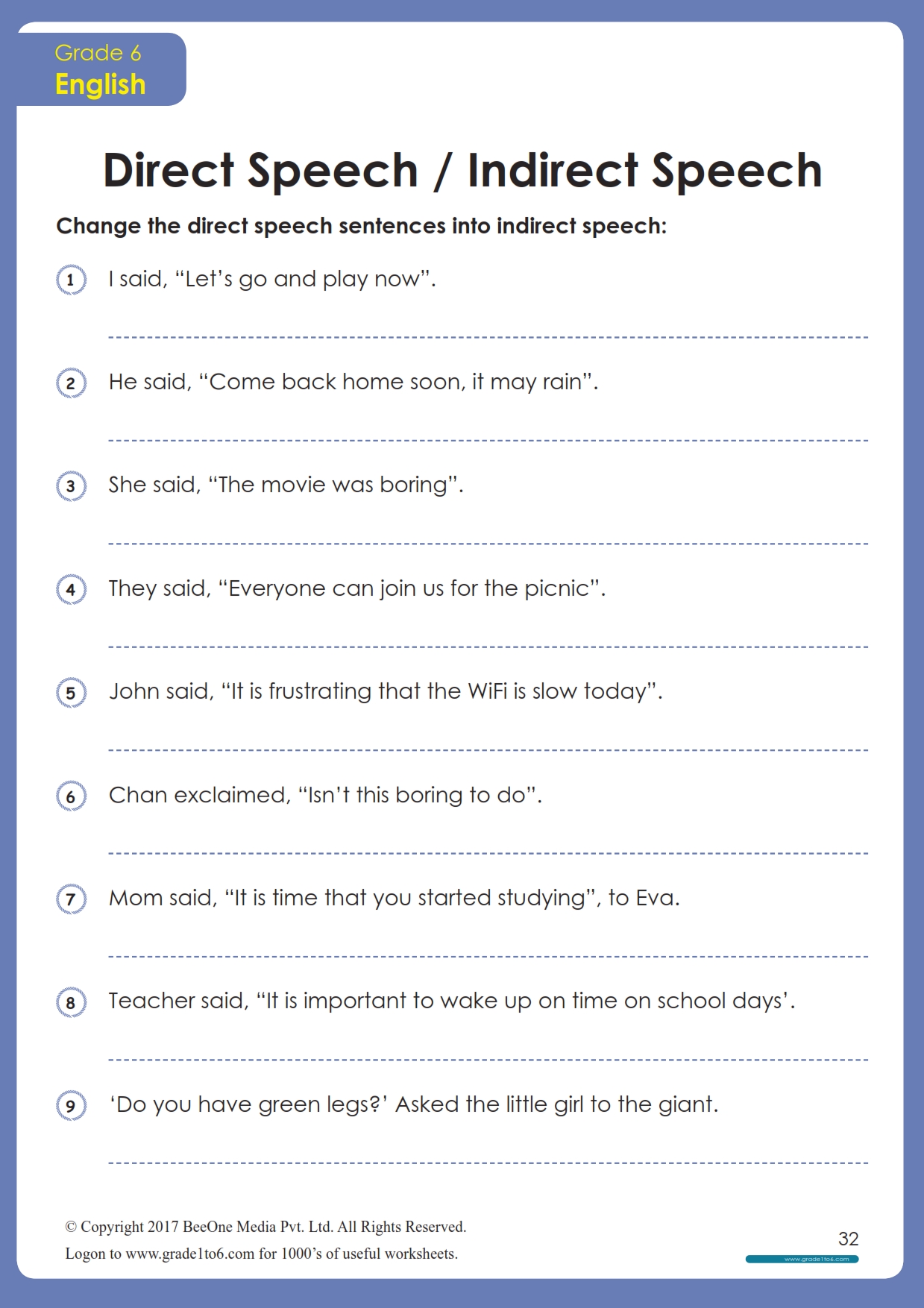
Help and Support
- Advertising & Marketing
- Terms and Conditions
BeeOne Media Private Limited Mayur Vihar, Phase - I Delhi - 110091 Email: [email protected] +91 99109 88727 (Phone and WhatsApp)
For any IPR(including Copyright) Licensing or other Contractual & Legal issues please contact our Attorneys:
Email: [email protected] / [email protected] Web: www.lexport.in
COPYRIGHT © GRADE1TO6.COM (A UNIT OF BEEONE MEDIA PVT. LTD.) New Delhi, 2016. All Rights Reserved.

- Cerita Pilihan
- Berlangganan

Apa Bedanya Direct and Indirect Speech dalam Bahasa Inggris?

GridKids.id - Kali ini kita akan membahas tentang direct and indirect speech dalam bahasa Inggris .
Yap, dalam bahasa Inggris kita juga mengenal kalimat langsung dan kalimat tidak langsung, Kids.
Dari cara penyampaiannya, direct speech diutarakan secara langsung tanpa adanya perubahan kalimat.
Sementara itu, indirect speech dilakukan untuk menyampaikan apa yang disampaikan orang lain.
Untuk itu, kalimatnya tak harus sama persis dengan yang dikatakan sebelumnya, ya.
Direct and Indirect Speech
Dikutip dari buku Easy English Grammar (2016) karya Rachmat Faisyal, direct speech adalah kalimat langsung yang diucapkan seorang pembicara.
Sedangkan indirect speech adalah kalimat tidak langsung yang menceritakan kembali kalimat, tanpa mengubah maksud atau artinya.
Ciri-Ciri Direct and Indirect Speech
Dilansir dari situs BBC Bitesize, ciri-ciri direct and indirect speech adalah:
- Harus menggunakan huruf kapital di awal direct speech.
Baca Juga: 15 Phrasal Verb dalam Bahasa Inggris, Lengkap dengan Makna dan Artinya
Bahasa inggris
Indirect speech.
Artikel ini merupakan bagian dari Parapuan
Parapuan adalah ruang aktualisasi diri perempuan untuk mencapai mimpinya.
PROMOTED CONTENT
Artikel terkait.

Minggu, 14 April 2024 | 14:00 WIB

Minggu, 14 April 2024 | 13:30 WIB

Senin, 15 April 2024 | 09:10 WIB
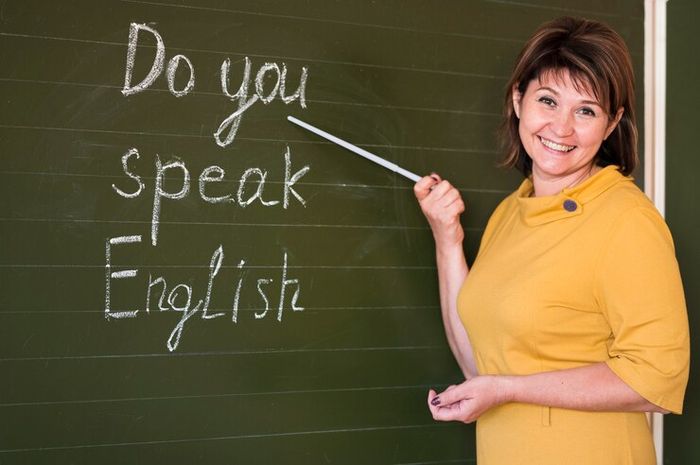
Selasa, 16 April 2024 | 10:00 WIB

Manchester City vs Real Madrid: Head to Head dan Link Live Streaming

Bayern Munchen vs Arsenal: Head to Head dan Link Live Streaming

Belajar Bahasa Daerah: Kosa Kata Bahasa Jawa Banten Berawalan Abjad H-J

Apakah Aman Memakan Daging Ikan Salmon Mentah-Mentah? #AkuBacaAkuTahu

Apa Saja Tanda-Tanda Usus yang Bermasalah? Simak Penjelasannya

Penelitian Ilmiah Ungkap Pandangan Orang Mesir Kuno tentang Galaksi Bimasakti, Seperti Apa?

Tak Hanya Alergi, Ini 3 Penyebab Bulu Kucing Rontok yang Perlu Diketahui

7 Manfaat Kayu Manis untuk Kesehatan, Baik untuk Lambung sampai Otak

4 Bahan Alami Ini Dapat Menghilangkan Bau dari Botol Minum Plastik, Apa Saja?

Sejarah Soto Garing (Toring), Sajian Soto Tanpa Kuah Khas Klaten
Tag Popular
- # bahasa Indonesia Kelas 7 Smp
- # contoh Kata
- # link Live Streaming
- # dampak Negatif
- # orde Baru
- # bahasa Indonesia
- # persebaya Vs Psis
- # dampak Positif
- # kata Konotasi

IMAGES
VIDEO
COMMENTS
The speaker said, 'Be quiet and listen to my words.'. Answers. 1. John said that he was very busy then. 2. He said that the horse had been fed. 3. John said that he knew/knows her name and address. (Note that the tenses may not change if the statement is still relevant or if it is a universal truth.)
Reported questions + commands exercises PDF. Practise the difference between the direct and indirect speech in questions, commands and requests. Online exercises with answers: Direct - indirect speech exercise 1 Rewrite sentences in the reported speech. Direct - indirect speech exercise 2 Report a short dialogue in the reported speech.
Reported speech 2. Reported requests and orders. Reported speech exercise. Reported questions - worksheet. Indirect speech - worksheet. Worksheets pdf - print. Grammar worksheets - handouts. Grammar - lessons. Reported speech - grammar notes.
Direct and Indirect Speech Exercises with Answers. When converting direct speech to indirect speech or vice-versa, you will have to take care to convert the verb, pronoun and the adverb appropriately. Go through the following exercises and try them out. Answers are given below each exercise; refer to them to see if your answers are right.
Exercise 2. Change the following mode of narration from direct Speech to indirect speech. (1) The boys said, "It has been raining since morning. We cannot play today." Ans: The boys said that it had been raining since morning so they could not play that day. (2) Anjan's mother said, "Your father has left for Mumbai." Ans: Anjan's mother said that my father had left for Mumbai.
The indirect speech is used to report someone's speech, often with words slightly changed. Convert a range of sentences including the interrogative, imperative, and exclamatory sentences into reported speech. Make your grammar life richer and more fulfilling with this coveted collection of quoted and reported speech worksheets pdf! Our direct ...
Direct speech is mainly used to write dialogue or quoted speech. Read how to punctuate direct speech below. Insert the first set of quotation marks. Begin the sentence or phrase inside the quotation marks with a capital letter. Place the correct punctuation (period, question mark, exclamation point, etc.) at the end of the sentence.
406 Reported Speech (Indirect speech) English ESL worksheets pdf & doc. SORT BY. Most popular. TIME PERIOD. All-time. Zmarques. Reported Speech. It consists of seven. 100740 uses. estrelapolar. REPORTED SPEECH - CH. An easy way to teach. 49640 uses. dobrawaa. Reported Speech - a . This is a boardgame . 46984 uses. Zmarques. Reported Speech.
Direct speech: "I'm seeing my brother tomorrow.". Indirect speech: She said she was seeing her brother the following day. Here are some other examples: Direct speech: "I had a headache yesterday.". Indirect speech: You said you'd had a headache the day before yesterday. Direct speech: "It's been raining since this afternoon.".
This grammar exercise tests your ability to use direct and indirect speech. Answers 1. Sam asked me if I was going to the party. 2.
Answer Keys Here. Direct speech is basically a quote or the literal words that were spoken by a subject. When you use this in your writing it must be surrounded by quotation marks (" "). Using direct quotes helps your audience understand the frame of mind of the subject. Indirect speech is reporting what was said by a subject.
Liveworksheets transforms your traditional printable worksheets into self-correcting interactive exercises that the students can do online and send to the teacher. ... English language (1061957) Main content: Direct Indirect Speech (1940895) Identify Direct and Indirect Speech. Other contents: Identify Direct and Indirect Speech ...
Note: That is often implied in indirect discourse. It is not mandatory to use it, so it is indicated in brackets in this lesson. Introductory verbs To relate someone's words to both direct and indirect speech, you need an introductory verb. The two most frequent are tell and say, but there are many other possible ones like: ask reply warn
Exercise to practice indirect speech. The students are supposed to change the direct sentences to indirect ones, paying attention on the verb tense, subject and pronouns. 264 uses. alejandrita2012.
B. Make sentences in reported indirect speech using the hints given in the brackets. Do not change the meaning of the sentence. 1. The traffic policeman said, 'Don't cross the road from anywhere. Use the zebra crossing.' (remind, urge) 2. The students said, 'We didn't understand'. (Use negative form) 3.
EXERCISE 2: Identify the structure of the sentences when verbs are in the direct and indirect speech. EXERCISE 3: Answer these questions to test your understanding of the key terms used to understand direct and indirect speech. EXERCISE 4: Give examples to show how the adverbs of nearness in direct speech change into those of distance in indirect.
These worksheets emphasize the difference between direct quotations (where the speaker's exact words are put inside quotation marks) and indirect quotations (no quotation marks are used). In these worksheets, students rewrite indirect quotations as direct quotations. Worksheet #1 Worksheet #2. Worksheet #3. Similar: Punctuating speech ...
Direct and indirect speech worksheet for class 7. Change the following sentences in direct speech to indirect speech. 1. Shyam said, "I want to buy a new laptop.'. 2. Rahul said to me, 'I am going to the movies.'. 3. Mother said to me. 'Learn your lessons.'.
Share / Print Worksheet. Change the following sentences from Indirect Speech to Direct Speech. Michelle said that his bike was broken. Nelson said that everyone should be free. The actor said to always remember to smile on stage. My teacher demanded that we study our spelling words every night. The kids yelled that recess is the best part of ...
Direct And Indirect Speech Worksheet For Class 8 CBSE. by Manjusha · February 22, 2022. Sentences are given in the direct speech. Change them into the indirect speech. 1. Ravi said, 'I am trying to find a job here.'. 2. She said, 'I am doing my homework.'. 3.
Explore more than 77 "Direct And Indirect Speech Worksheets" resources for teachers, parents and pupils as well as related resources on "Direct And Indirect Speech Worksheet". Instant access to inspirational lesson plans, schemes of work, assessment, interactive activities, resource packs, PowerPoints, teaching ideas at Twinkl!
Direct Speech and Indirect Speech. Change the indirect speech into direct speech in this worksheet. 1. The movie was boring when changed becomes The speaker said that the movie was boring. Schools and students globally prefer Math and English worksheets from www.grade1to6.com, Subscribe today for a complete learning resource pack. Download Now.
reported speech. Explore more than 78 "Direct And Indirect Speech Worksheets" resources for teachers, parents and pupils as well as related resources on "Direct And Indirect Speech". Find lots of Foundation, Intermediate and Senior Phase resources for South African teachers and educators, aligned to the CAPS curriculum right here!
Dikutip dari buku Easy English Grammar (2016) karya Rachmat Faisyal, direct speech adalah kalimat langsung yang diucapkan seorang pembicara. Sedangkan indirect speech adalah kalimat tidak langsung yang menceritakan kembali kalimat, tanpa mengubah maksud atau artinya.. Ciri-Ciri Direct and Indirect Speech . Dilansir dari situs BBC Bitesize, ciri-ciri direct and indirect speech adalah: